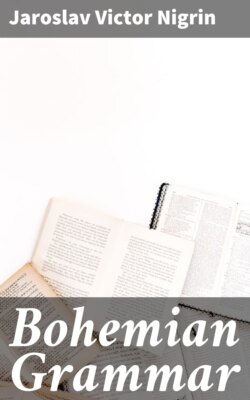Читать книгу Bohemian Grammar - Jaroslav Victor Nigrin - Страница 21
На сайте Литреса книга снята с продажи.
di, ti, ni.
ОглавлениеSyllables di, ti, ni are pronounced as if written ďi, ťi, ňi, leaving out the “v” hook is an exception in writing.
Distinguish carefully in writing and speaking the syllables di, ti, ni, from dy, ty, ny. This is very important!
Examples:—zvony, bells; zvoní, rings; u vody, by the water; vodí, leads; letí, flies; tety, aunts; noviny, newspaper; nic, nothing; ticho, silence; boty, boots; vždy, always; divadlo, theater.
| Verbs. | Slovíčka. |
|---|---|
| Jsem, I am, | Jsme, we are, |
| jsi, thou art, | jste, you are, |
| on jest (abbreviated je), he is, | ona jest (je), she is, |
| máš, thou hast, | máte, you have, |
| znáš, thou knowst, | znáte, you know, |
| voláš, thou calls, | voláte, you call. |
The second person singular jsi, máš, voláš etc. corresponds to our: thou art, thou hast, thou callest etc. These forms, however, are obsolete in English and therefore the Bohemian forms ought to be translated by you are, you have, you call etc.
In Bohemian the singular forms jsi, máš, etc. are used in a familiar way, in talking to intimate friends, to children, or among the members of the family. The plural forms, jste, máte etc. are the polite forms to be used by the stranger.
